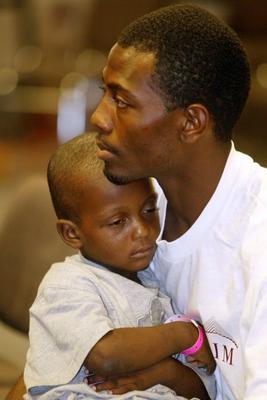
DO YOU KNOW WHAT IT MEANS?

Do you know what it means, what happened
in New Orleans? To understand it, we must look to the nation's past.
In the beginning years of the Civil War, many union soldiers were ambivalent about
slavery, and did not think its abolition was a cause worth dying for.
"Father I want you to write and tell me what you think of Lincoln's proclamation
setting all of the Negroes free," Weymouth, Ohio volunteer Chauncey Welton wrote
from Frankfurt, Kentucky in early 1863. "I can tell you we don't think much
of it here in the army for we did not enlist to fight for the negro and I can tell
you that we never shall or many of us any how. No never."
Later, as the union army marched deeper into the South, those attitudes began to
change. As soldiers came more and more in contact with African captives, slavery
grew human form—women with babies at their breasts as they worked the fields, old
men crippled and bent from years of toil, people with backs horribly scarred by an
overseer's whippings. Slavery was no longer some abstract, faraway policy in a distant
land. Its consequences were real, and immediate. Its victims were human, and could
no longer be ignored, or rationalized away.
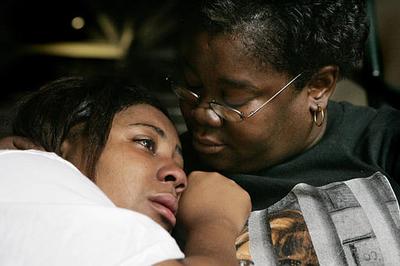 Thus, so, looking today into the anguished eyes of those we left behind
in New Orleans in our rush to higher ground, we have come face to face with the human
consequences of a generation of national politics and policy, and we are sickened
and horrified for the moment by the revealed sight of what the nation has so long
sought to keep in the dark.
Thus, so, looking today into the anguished eyes of those we left behind
in New Orleans in our rush to higher ground, we have come face to face with the human
consequences of a generation of national politics and policy, and we are sickened
and horrified for the moment by the revealed sight of what the nation has so long
sought to keep in the dark.
Do you know what it means?
New Orleans in the wake of Katrina is the underside of America, my friends, what
we find when we turn over the pretty rocks lining our national garden. New Orleans
after Katrina, rotting, writhing, tearing at its breast, crying out in its anguish
"How could you leave us like this, so long, we who are your family and fellow
citizens? What is it that we have done to you, to be abandoned, so?" Madam Katrina,
with her black waters and howling stormwinds, has torn down all the curtains that
covered our back rooms, exposing our national shame, leaving behind for all to see
the bodies left rotting in the flooded streets, putrefying pillars that prop up the
nation that is, not the nation that we pretend it to be. Let us linger long and burn
the ghastly images into our brains before we are sucked back into the mindless carnival
that is our "mainstream" national cultural life, before the "reality"
we see on the "reality" shows begins, once more, to obscure what is actually
real.
New Orleans was one of our national playgrounds, where people came to hear Louis
and the Nevilles and throw quarters into the hats of skin-legged boys doing their
sidewalk taps. Wandering home late from the all-night jazz clubs or steamboat rides
on the river, folks didn't bother to watch where the prostitutes went to spend their
hours when the sun was up. Not caring, in fact. Folks slept in during the early morning
hours while the old men swept the bright paper and bottles and colored beads from
streets left befouled and littered in the night's casual revelry. Who parked the
cars while the tourists wandered up the ramps into the floating casinos? Who put
fresh linen on the motel beds while the occupants were downstairs eating cajun or
creole? Who was up at five in the morning to sweat in the kitchen, cooking those
delicious dishes? Who's asking? Who cared, before this week? Not enough of us, my
friends. Not enough.
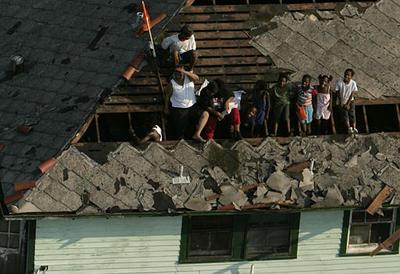 Out of sight. Out of mind.
Out of sight. Out of mind.
Do you know what that means?
It has been asked how the Christian could countenance slavery, since God clearly
could not approve such treatment of his own created children. The solution was for
many to pretend that the African was something other than human, better off for the
American experience, suited for plantation labor. "They do not feel pain and
suffering as we do," it was argued. "Did you not see how they were
living, naked and savage in the jungle?" Or, as Mr. Jefferson succinctly justified
the accumulation of his family wealth in "Notes On Virginia": "They
seem to require less sleep."
What man seeks to brutalize, he must first minimize.
And so, in the last quarter century, from the Reagan years on, while the Movement
slept, we have seen the marginalization of a whole section of the American population.
It is the "underclass," our leaders are fond of saying, stripping people
of their faces and names and identity and making them anonymous, so that we do not
have to look into their eyes as we eat our supper. The backwash of success from the
civil rights struggles obscures our vision. Michael Jordan makes millions selling
basketball and underwear. Rappers give us televised tours of their palaces, flashing
the bling on their fingers. The Huxtables become iconic, the model American family.
Blacks travel into space. Run international corporations. Sit on the High Court.
But behind it all, rarely mentioned in our national dialogue, entire communities
of color are being swept constantly and steadily backwards, like so much unwanted
dust into a trash bin.
Do you know what that means?
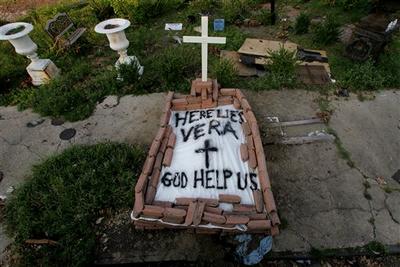 God hates the poor, so, the South Carolina joke used to go. That's why
he sends tornadoes to trailer parks. Today, that joke has no humor, not at all.
God hates the poor, so, the South Carolina joke used to go. That's why
he sends tornadoes to trailer parks. Today, that joke has no humor, not at all.
In New Orleans, it is now being said in louder and louder voices, "they"
might have saved themselves, had they only heeded the warnings to evacuate the city
before Katrina came calling.
So, too, we are told it is the fault of this "underclass" themselves that
they have not kept up, these dark ones left further and further behind as the rest
of the nation rolls on ahead.
We have coddled them too long, with these welfare checks and social programs. What
they need, now, "tough love," or "benign neglect," so that they
can learn to make it on their own, as "we" have.
Of course, perhaps some of "them" are incapable of learning. There are,
after all, no more barriers to their advancement, as there were in the distant past.
The Irish did it. The Italians did it. The Jews did it. Even many of their own kind
have done it, as well. So if "they" cannot do it, these dark ones who have
been left in our lurch, it must be something in their own character that holds them
back. Some flaw. Some lack of social organization. Some edict of God. Mustn't it?
This week, in our moment of bright revelation, all that sounds so hollow.
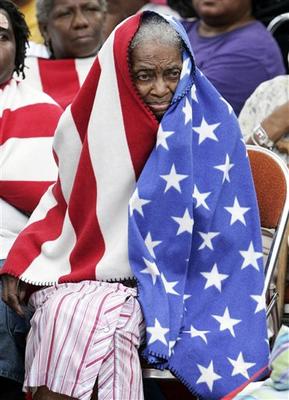 For a moment, just the briefest of moments, Katrina laid us all bare,
washing away our national justifications in the stinking tide that settled over the
Crescent City's streets. We—many of us—too many of us—left our friends and family
members and fellow citizens and fellow human beings to suffer and to die, while we
scrambled to safety, and if you think I am simply talking about the days of the hurricane,
you have already missed the point. This week, the administration of George W. Bush
scrambles to make up for the lost three days while it vacationed in Texas and shopped
for shoes in New York. This week, America pours out its heart to the survivors. But
why and how were they left behind in the first place? Left behind in New Orleans.
Left behind in the nation, these last thirty years.
For a moment, just the briefest of moments, Katrina laid us all bare,
washing away our national justifications in the stinking tide that settled over the
Crescent City's streets. We—many of us—too many of us—left our friends and family
members and fellow citizens and fellow human beings to suffer and to die, while we
scrambled to safety, and if you think I am simply talking about the days of the hurricane,
you have already missed the point. This week, the administration of George W. Bush
scrambles to make up for the lost three days while it vacationed in Texas and shopped
for shoes in New York. This week, America pours out its heart to the survivors. But
why and how were they left behind in the first place? Left behind in New Orleans.
Left behind in the nation, these last thirty years.
Do you know what that means?
Do you know what that means?
Do you know what that means, about us, about who we are, about what we have become
in our nation?
If you don't, you better ask somebody.